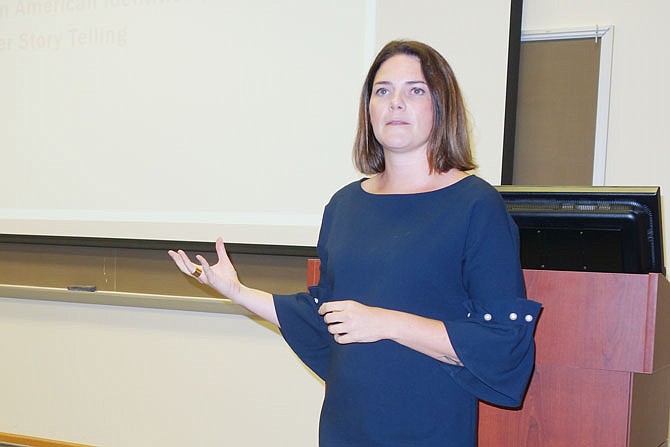A William Woods University professor wants to bring women from all cultures and backgrounds closer together.
"I want human beings to see what they have in common despite their differences," associate professor of Education Rachel Turney said.
To accomplish that, she first looked at how women see themselves. Turney presented the results of her preliminary research into the subject Wednesday.
She asked women of three particular backgrounds - Muslim Americans, white Christians and black Christians - three not-so-simple questions. First: What does it mean to be a woman?
"It took me two weeks to formulate that question," she said with a laugh.
Second, she asked, "Are you proud of who you are?" The final question was, "Do you feel you have met society's expectations of you as a woman?"
Turney began collecting data in 2017. Her pool of respondents is relatively small, and the study was not particularly academically rigorous, she said. Nevertheless, Turney was struck by the similarities and differences among the answers each group gave.
Women who identified as Muslims talked about filling a particular role in their community and demonstrating strength and values. African-American women frequently brought up their faith and talked about pride and empowerment. White women seemed frustrated, and were the only group to bring up how men perceive women - underestimating and overlooking them, the respondents said.
"Overall, white women were angry," Turney said.
More striking, perhaps, are the things respondents had in common.
"Every single woman brought up these concepts," she said, pulling up the next slide.
The concepts were "fighting" (as in, fighting for one's rights or beliefs), "caring" (for children, for political causes, etc.) and "pride" (in one's accomplishments, identity and so on).
Turney said she thinks it's important to look at the differences and similarities. Her reasoning ties into how the study came about.
While working on her doctorate, Turney spent time teaching at an elementary school in south St. Louis. Many of her students came from Muslim families in Bosnia. Turney realized she didn't understand her students' culture and perspectives, and she requested a grant from the National Endowment for the Humanities to conduct a study.
The study's purpose began to shift after Turney encountered a parable from the Sufi sect of Islam. It tells the story of a monkey perched in a tree, observing fish swimming in the stream below. To the monkey, it appeared the fish were struggling and drowning, so one by one, he lifted them out and set them ashore. But what's good for a monkey isn't necessarily good for a fish.
At the time, Turney was interacting with women from Saudi Arabia - a county where, until recently, women were banned from driving. They told her about how complicated the issue, and lifting the ban, could be.
Turney felt a kinship with those women and other women worldwide who are struggling to enact change.
"There's a lot of power in being white," she said. "There's a lot of power in coming from a background of privilege, like I did."
However, Turney said she doesn't want to "monkey" in a situation without an understanding of the true needs and wants of the women involved. Thus began the effort to understand how women's backgrounds affect their self-perception.
She's particularly working on building trust and gaining access to Muslim communities.
Turney hopes to continue research on the topic and plans to present the results at a 2019 conference in Turkey.

